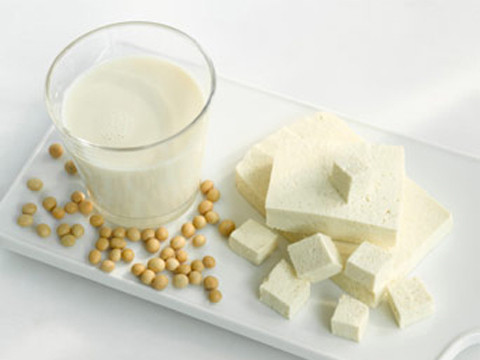Eating soybeans: “Strong bones, delayed menopause”?
Many women entering menopause often tell each other to eat a lot of soybeans to "strengthen bones and slow down menopause".
·
Some people even believe with absolute confidence that this food can replace medical treatments. Really?

Eating soybeans: “Strong bones, slow aging”?
through the trouble
Menopause is a natural change in a woman's body, usually occurring around the age of 45 - 55. This is when the hormones that regulate the activities in a woman's body are severely deficient because the ovaries no longer ovulate. The lack of hormones, in which estrogen plays a very important role, causes many adverse changes in both the body and psychology. Women in menopause often experience hot flashes (hot flashes), night sweats, are often stressed and irritable. Estrogen deficiency makes the skeletal system more susceptible to fractures due to calcium loss, leading to more "porous" bones. Estrogen deficiency also increases the risk of cardiovascular disease.
Hormone replacement therapy has been shown to be effective in relieving the discomforts commonly associated with menopause, as well as reducing the risk of osteoporosis and cardiovascular disease. Postmenopausal fractures in women treated with hormone replacement therapy were reduced by 35-60%. However, in addition to being expensive, hormone replacement therapy may increase the risk of breast cancer if not monitored properly.
Only partially compensate
Women in some Asian countries, especially Japan, do not experience as much discomfort during menopause as those in North America or Europe. The Japanese language does not even have a word to describe hot flashes! Many researchers have found that one of the main reasons for this phenomenon is that Japanese women often use soybeans as a daily food, and soybeans have contributed to providing estrogen to continue regulating the body's activities.
Soybean intake 1–4 times daily is effective in reducing menopausal discomfort, but the optimal dietary intake of soy remains unclear.
Soybeans are one of the foods rich in isoflavones, a type of plant estrogen. Isoflavones have the same function as estrogen but are weaker. Eating a lot of soybeans is the reason why isoflavones (in urine) of Japanese women are 100-1,000 times higher than women in the United States or Finland.
Studies have shown that a soy diet also improves bone density, reducing the risk of fractures. When using a soy-rich diet for 12 weeks, Australian researchers recorded a 5.2% increase in bone density. If this diet lasted for six months, the bone density of menopausal women increased significantly. Many studies around the world also confirmed the effectiveness of soy in reducing discomfort during menopause. A group of Italian doctors found that the frequency of hot flashes decreased by 45% in a group of menopausal women who used 60g of soy daily (equivalent to 76mg of isoflavones) for 12 weeks. A soy-rich diet can help stabilize blood pressure and reduce discomfort of menopause without side effects (common when using hormone replacement therapy).
However, although there is a lot of evidence that a diet of 1-4 servings of soy a day is effective in reducing the discomfort of menopause, the proportion of soy in the diet to achieve the effect is still not properly answered. Nevertheless, a diet rich in soy should be encouraged because it is easy to follow, inexpensive and can bring many benefits, in addition to reducing the risk of osteoporosis and the discomfort of menopause. It should be noted that the use of soy cannot completely replace other treatments for women with menopause and osteoporosis.
According to Dan Tri - nt
